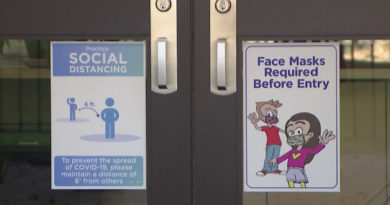$75 billion required to fix flawed U.S. Covid-19 testing, report says
The U.S. should invest $75 billion in order to fix its badly flawed system of diagnostic testing for Covid-19, according to a bipartisan committee of industry experts, investors, scientists, and former federal health officials assembled by the Rockefeller Foundation.
“America faces an impending disaster,” the foundation’s panel warns in a 55-page report released Thursday. “The extraordinary scale of the Covid-19 crisis is evident in the growing deaths and economic losses the pandemic has wrought in every state.” The report adds: “This terrifying tragedy was not and is not inevitable.”
The report, which includes among its authors several former commissioners of the Food and Drug Administration and a who’s who of researchers in pandemic preparedness and diagnostic testing, suggests several steps for improving the U.S. response, including a dramatic ramp-up in different types of tests. The Rockefeller Foundation is also committing $100 million to the global coronavirus response.
advertisement
Rajiv Shah, the foundation’s president, said he could point to “half a dozen, maybe three dozen” other countries, including South Korea, New Zealand, Australia, Iceland, and Germany, that have done better than the U.S. by using widespread diagnostic testing to identify people who are sick early and better control the spread of the virus.
Testing, Shah said during a media briefing, is “the legitimate way out of the conundrum of either having tens of thousands, now hundreds of thousands, of Americans die of Covid-19 or having a lockdown that forces economic pain.” Paul Romer, a report co-author and the co-recipient of the 2018 Nobel Prize in economics, estimates shutdowns cost the U.S. economy $300 billion to $400 billion a month.
advertisement
The same committee previously suggested that the U.S. develop the capacity to conduct 3 million diagnostic tests a week this summer and then reach 30 million tests a week by October, when flu season will begin. But the experts said it is now clear that the rate of testing must be ramped up even faster, employing multiple strategies.
One major problem is that even though U.S. laboratories are now conducting 4.5 million Covid-19 tests a week, many patients are waiting seven days or longer to get test results. This makes the tests almost useless.
“This is just unacceptable, because by the time you get test results back, you’ve already infected many, many people,” said Mara Aspinall, a professor at the College of Health Solutions at Arizona State University and a report co-author.
The report offers two basic solutions to this problem. One is to further ramp up the existing technology, known as PCR, that is mostly used in the U.S., and to get turnaround times below 48 hours for those tests. The other is the widespread distribution of a cheaper, less accurate type of test, known as an antigen test, that can be conducted at home, in schools, or in offices. The antigen tests may miss 25% of cases, but by using them to screen people who do not have symptoms, the Rockefeller authors think they could catch many people who don’t have symptoms but are infectious. The report lists several tests that could play this role that are already approved, but notes that more would be needed and that they would need to be purchased in massive numbers by the federal government.
While $75 billion might sound large, Romer, the economist, said that it is very small compared to the potential benefit from such a plan. “There is actually a pretty broad consensus among Republicans and Democrats in Congress to back this level of spending on testing,” Romer said. The problem is that the testing money could get bogged down in the political fight over extending unemployment benefits, something Romer called less important. The “worst outcome,” he said, would be if Congress doesn’t embrace new funding for testing before the August recess.
The U.S. will need at least 5 million PCR tests a week, with results returned much faster than they are currently, said Michael Pellini, a venture capitalist at Section 32 and a report co-author. For the antigen tests, there will need to be upward of 30 million, which means they will need to be inexpensive — less than $10 a test, potentially substantially less.
“There has been no plan and there is no plan, and that is the danger,” said Pellini. “No country is perfect, but the ones that have done well, some exceptionally well, all have plans.”




